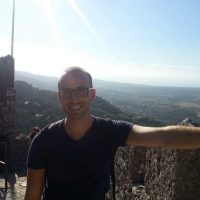
Anthony Zoccoli
Ph.D. Candidate
| Degrees: | B.A. (Ottawa), M.A. (McMaster), B.Ed. (Ottawa) |
| Email: | anthonyzoccoli@cmail.carleton.ca |
| Twitter: | Follow |
Current Program (including year of entry): Ph.D. (2017)
Supervisor:
Academic Interests:
Place and local history; public history; oral history; cultural history; pedagogy of history; history of education; commemoration; memorialization; memory.
Select Publications and Current Projects:
Currently working on a project that discusses community-produced murals, and their impact upon community formation, within the context of urban high school closure within the National Capital Region. (forthcoming)
Select Conference Publications:
“’Heart and Soul of the City’: The Fluidity of Historical Memory, Public Commemoration, and the Importance of Physical Space in Gore Park, Hamilton, Ontario, 1860-2015.” History, Heritage, and Memory Graduate Symposium, McMaster University, Hamilton. April 2015.
Teaching Experience:
- Britain in the Modern Era, 1800-2000 (S. Heathorn), McMaster University, Fall 2014.
- Peace and Popular Culture (K. Espiritu), McMaster University, Fall 2015. Includes guest lectures.
- Canadian History Since the First World War; Canadian Families, Introduction to Canadian Law (Ottawa-Carleton District School Board), 2015-17.
- Canadian Business History (M. Bellamy), Carleton University, Fall 2017.
Description of Research:
To walk down the streets of any city or town in Canada, one is confronted with history, sometimes subtly in the case of houses or historic buildings, and sometimes more bluntly in the form of monuments, museums, and historic plaques. Every place, from parks to monuments to houses, has a story to tell. One can read books about Prime Ministers Macdonald and Laurier, but walking by their houses in Ottawa’s Sandy Hill neighbourhood personalizes them in a much more meaningful way. One can also see how they lived (quite literally in Laurier’s case, as his house is now a museum), and begin to understand their physical neighbourhoods., even follow the routes they might have taken to get to work. The curious can also read about the construction of the Rideau Canal, but by walking- or skating- its route, one can more easily understand the context its builders faced.
Drawing on my experiences studying and teaching history, I hope to develop a teaching package that will bridge the often large divide between academia and public history. I’ll be developing a tangible, and usable, product to facilitate history education. Learning history using tangibles, like the local built environment, is a more engaging entry to history than taking notes, or memorizing dates. Using the Ontario Secondary School history curriculum as a base, I would like to develop a wide variety of teaching aids, from unit/lesson plans, to podcasts, to potentially mobile phone applications that will both enhance historical thinking skills, and capitalize on interest with place-based history. These educational materials will build on the existing academic historiography being produced with the intent of translating academic historiographical work into new, tangible, and affecting materials for high school historical learning.